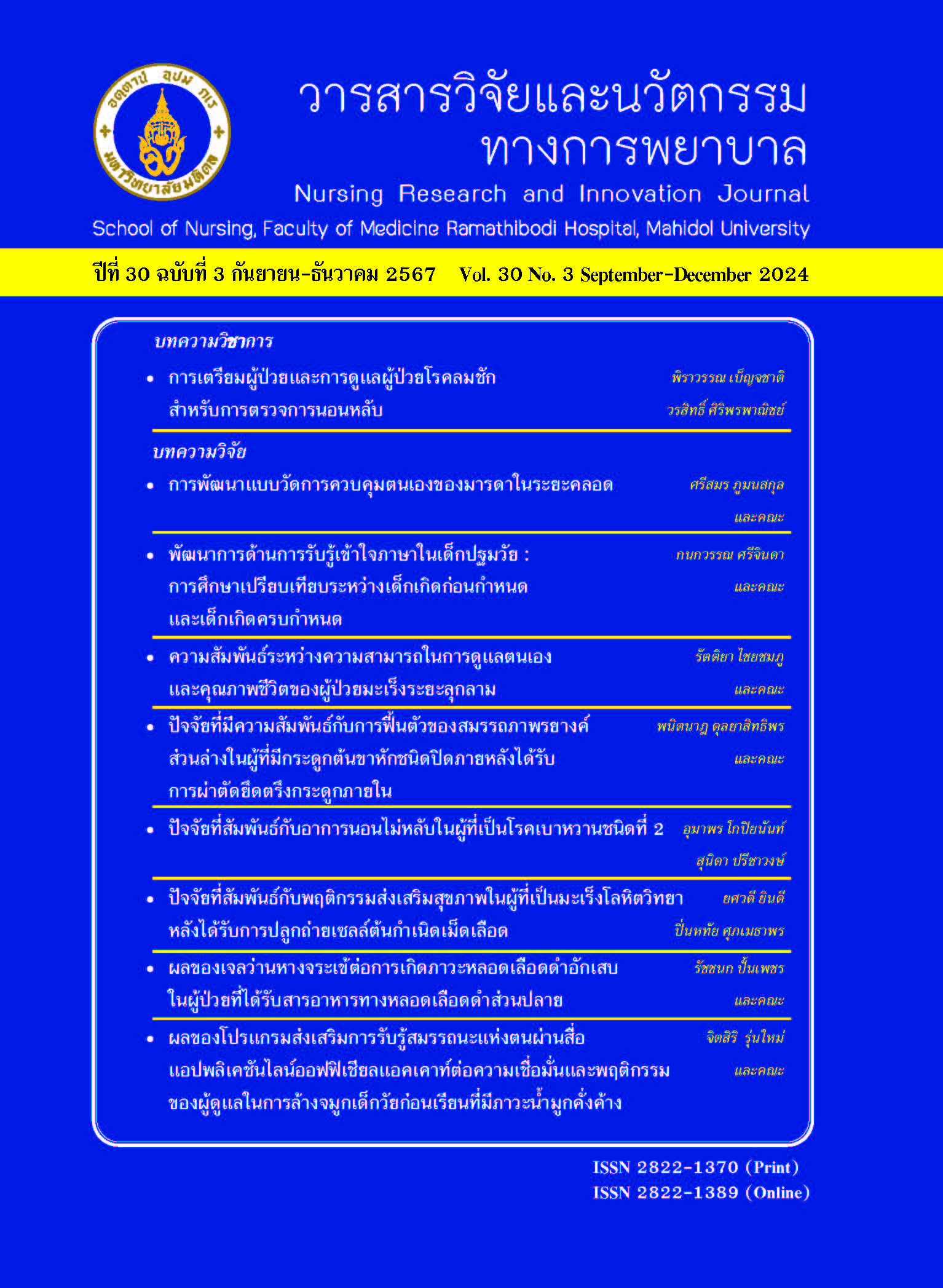The Effects of Perceived Self-Efficacy Enhancement Program Using Line Official Account Application on Beliefs and Behaviors of Caregivers to Perform Nasal Irrigation for Preschool Children with Retained Nasal Secretion
Main Article Content
Abstract
This quasi-experimental study with a two-group repeated measures design aimed to examine the effects of the Perceived Self-Efficacy Enhancement Program using Line Official Account application on beliefs and behaviors of caregivers to perform nasal irrigation for preschool children with retained nasal secretion. The participants were 32 caregivers with non-experience in nasal irrigation and providing care to pediatric patients who visited the pediatric outpatient department at a tertiary hospital selected by purposive sampling. They were divided into the control group (n = 16)and the experimental group (n = 16). The control group received only usual care, and the experimental group received the Self-Efficacy Enhancement Program using the Line Official Account application.The instruments for data collection were the Personal Information Questionnaire, the Caregiver Beliefs Questionnaire, and the Caregiver Behavioral Observation Form. Descriptive statistics were used to analyze the general characteristics of the sample. A comparison of the mean beliefs and behaviors scores of caregivers to perform nasal irrigation for preschool children was conducted between the experimental group and the control group in three phases: before participating in the program, on day 1 of the program, and on day 5 of the program. The two-way repeated measures ANOVA was used to analyze the data. The results of the study revealed that in the pre-intervention phase, the beliefs and behaviors scores of caregivers between the control and experimental groups had no significant differences; on day 1 of the program and on day 5 of the program, the experimental group had significantly higher beliefs scores and more appropriate nasal irrigation behaviors than the control group. Therefore, nurses can use the Self-Efficacy Enhancement Program using Line Official Account application to increase caregivers' ability to effectively perform nasal irrigation for preschool children with retained nasal secretion.
Keywords: Line Official Account, Nasal Irrigation, Preschool Children, Self-Efficacy
Article Details

This work is licensed under a Creative Commons Attribution-NonCommercial-NoDerivatives 4.0 International License.
บทความ ข้อมูล เนื้อหา รูปภาพ ฯลฯ ที่ได้รับการตีพิมพ์ในรามาธิบดีพยาบาลสาร ถือเป็นลิขสิทธิ์ของวารสาร หากบุคคลหรือหน่วยงานใดต้องการนำทั้งหมดหรือส่วนหนึ่งส่วนใดไปเผยแพร่หรือเพื่อกระทำการใด ใด จะต้องได้รับอนุญาตเป็นลายลักษณ์อักษรจากรามาธิบดีพยาบาลสารก่อนเท่านั้น
References
Schmidt SK, Brou L, Deakyne SJ, Mistry RD, Scott HF.Frequency and characterization of tracheal intubation adverse events in pediatric sepsis. Pediatr Crit Care Med.2018;19(2):80-7.
Niyomwit K, Khammarit S. Nursing care for reducing secretion retention in pediatric patients. Journal of Phrapokklao Nursing College. 2019;30(1):216-25. (in Thai)
Abdullah B, Periasamy C, Ismail R. Nasal irrigation as treatment in sinonasal symptoms relief: a review of its efficacy and clinical applications. Indian J Otolaryngol Head Neck Surg. 2019;71(3):1718-26.
Klossner N, Hatfield T. Introductory maternity & pediatric nursing. 2nd ed. Philadelphia: Lippincott Williams &Wilkins; 2010.
Barham HP, Harvey RJ. Nasal saline irrigation: therapeutic or homeopathic. Braz J of Otorhinolaryngol. 2015;81(5):457-58.
Santoro E, Kalita P, Novak P. The role of saline nasal sprays or drops in nasal hygiene: a review of the evidence and clinical perspectives. Rhino Online. 2021;4(1):1-16.
Department of Medical Statistics, Somdech Phra Pinklao Hospital. The report of medical statistics year 2024. [Internet]. [cited 2024 June 24]. Available from Somdech Phra Pinklao Hospital Web site: https://www.spph.go.th/stats.php?y=2024 (in Thai)
Orem DE. Nursing: concepts of practice. 6th ed. St. Louis:Mosby; 2001.
Threesoon P, Rodcumdee B. The effects of maternal coaching program on caring behaviors for toddler with pneumonia. Journal of Nursing and Health Care 2017;35(1): 55-63. (in Thai).
Bandura A. Self-efficacy: toward a unifying theory of behavioral change. Psychol Rev. 1977;84(2):191-215.
Tanajaroenchananchai R, Pongjaturawit Y, Chaimongkol N. The effect of the perceived self-efficacy promotion program on maternal confidence to perform nasal irrigation for children with retained nasal secretion. The Journal of Faculty of Nursing Burapa University. 2014;22(2):28-38.(in Thai)
Kaewsalai R. The effect of a perceived self-efficacy promotion program on caregivers’ skills in nasal irrigation for sick children with retained nasal secretion. Journal of Health Science Research. 2023;17(2):121-30. (in Thai)
Watcharajitbaworn N, Tassanayim P, Sasopha J. The effect of using a nasal irrigation technique program via LINE application on self-nasal irrigation skills and nasal symptoms in patients with sinusitis. Journal of Information and Learning. 2023;34(2):112-24. (in Thai)
Kanseub A. The effects of a self-efficacy promotion program on caregivers’ confidence to perform nasal irrigation for sick children with retained nasal secretion in Fang Hospital, Chiang Mai Province. Journal of Nakornping Hospital. 2020;11(2):113-31. (in Thai)
Lee JM, Jeong KS, Min HY. The effects of smartphone-based nebulizer therapy education on parent’s knowledge and confidence of performance in caring for children with respiratory failure. J Pediatr Nurs. 2017;36(1):13-19.
Sungkasrisombu K, Machara S, Promsri M, Panit N.Development of health education and health counseling model using line official account application for mothers in caring for infants with premature births. Regional Health Promotion Center 9. 2022;16(2):623-41. (in Thai)
Mayer RE. Evidence-based principles for how to design effective instructional videos. J Appl Res Mem Cogn.2021;10(2):229-40.
Phongkamonkull C, Pongjaturawit Y, Chaimongkol N.Effect of maternal self–efficacy enhancement program using media through smartphone on maternal behavior in caring for children with pneumonia. Journal of Bamrasnaradura Infectious Diseases Institute. 2021;15(1):37-48. (in Thai)
Kasemkitvatana S. Nursing research, nursing informatics and statistics. 3rd ed. Nonthaburi: Sukhothai Thammathirat
Open University Press; 2017. (in Thai)
Srisathitnarakun B. Development and validation of research instruments: psychometric properties. 3rd ed. Bangkok:Chulalongkorn University Press; 2018. (in Thai)
Johnson A, Kumar M, Jacob R, Jessie M, Mary F, Agrawal T, et al. Fear of childbirth among pregnant women availing antenatal services in a maternity hospital in Rural Karnataka. Indian Psychiatric Society - South Zonal Branch. 2019;41(4):318-22.
Khwepeya M, Lee G, Chen S, Kuo S. Childbirth fear and related factors among pregnant and postpartum women in Malawi. BMC Pregnancy and Childbirth. 2018;18(391):1-10.


